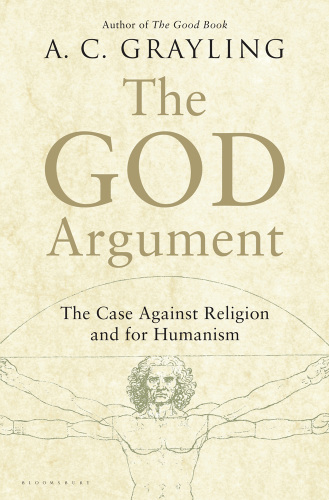
The God Argument
The Case Against Religion and for Humanism
کتاب های مرتبط
- اطلاعات
- نقد و بررسی
- دیدگاه کاربران
نقد و بررسی

March 25, 2013
In his 31st book, the eminent English philosopher re-examines the arguments for and against God and falls firmly in the camp of the nonbelievers. There is not a lot of new ground covered hereâKant, Descartes, Hume and Locke all fall under the microscope, and Grayling has intelligently tackled religious belief in a long list of other books, including The Good Book (2011). While Grayling makes a thoughtful case in engaging writing for humanismâa belief in the potential of human beings and their rationalityâhe, like so many others, fails to offer religious readers a reason to rally behind it beyond common sense. Like so many atheist writers, Grayling assumes that all believers are fundamentalists, with little nuanced beliefs, implying that believing in the divinity of Jesus is the equivalent of believing in the Tooth Fairy and Santa Claus. Until Grayling and other atheist writers recognize that religious believers, too, have brains that can be appealed to and must also be reached not only with emotion, his book and others like it are just more preaching to the atheist choir.

February 15, 2013
A spirited repudiation of pies and deities in the sky in favor of an ethic that "is about this world." London-based academic and philosopher Grayling (To Set Prometheus Free, 2010, etc.) has the sharp analytical mind of fellow naysayer Richard Dawkins, though he is gentler about saying no to God or god or gods. Grayling first makes the distinction between the consolations of belief and the attendant costs, writing that while some people are indeed likely to feel some sense of enhanced well-being at the thought of a supreme being, "the burdens are social and political as well as personal." One need only look at some of the legislation coming through the more pious American states to see his point. Grayling proposes against religion "as such, in any form," a grown-up philosophy that requires both personal accountability and social awareness, that addresses some of the big-picture items that religion sometimes obscures or evades--sex, for one thing. That "grown-up" qualifier is important, for Grayling considers religious belief to be a species of superstition, "a hangover from the infancy of modern humanity, sticky and enduring because of the vested interests of religious organizations, proselytization of children, complicity of temporal powers requiring the social and moral policing that religion offers, and human psychology itself." That's about as stern as the author gets, so readers looking for fire-and-brimstone contrarianism will want to turn to Dawkins or the late Christopher Hitchens instead. Mild though the rebuke is, a readable and persuasive argument--if, of course, an exercise in preaching to the choir.
COPYRIGHT(2013) Kirkus Reviews, ALL RIGHTS RESERVED.

March 1, 2013
The newest offering by prolific English philosopher Grayling (Master, New Coll. of the Humanities, London; The Good Book: A Humanist Bible) is essentially two books in one. The first part is a now fairly standard atheistic critique of religion, in the vein of Richard Dawkins, in which Grayling viciously attacks religion at its root, sparing not even moderate believers. Along the way, he assesses the teleological, ontological, and cosmological arguments for the existence of God, as well as Pascal's Wager. The second part is a positive argument in support of humanism as an approach to ethics, which calls to mind the life and writings of philosopher Paul Kurtz. Drawing largely from classical Greek philosophy, Grayling lays out one potential path (among others) to a life of meaning, value, and virtue without God. A highlight is the section about death and dying from a humanistic perspective. VERDICT Grayling's evisceration of even the moderately religious will unnecessarily alienate many potential readers and partners in his humanistic vision. Recommended for fans of Dawkins, Christopher Hitchens, and Sam Harris.--Brian Sullivan, Alfred Univ. Lib., NY
Copyright 2013 Library Journal, LLC Used with permission.

























دیدگاه کاربران